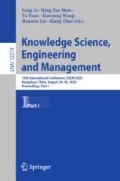Abstract
With the development of computer technology, more and more people begin to learn programming. And there are a lot of platforms for programmers to practice. It’s often difficult for these platforms to customize the needs of users at different levels. In this paper, we address the above limitations and propose an intelligent tutoring model, to help programming platforms achieve better tutoring for different levels of users. We first devise a novel framework for programming education tutoring which is combined with programming education knowledge graph, crowdsourcing system and online knowledge tracing. Then, by ontology definition, information extraction and data fusion, we construct a knowledge graph to store the data in a more structured way. During the knowledge tracing stage, we extract behavior features and question knowledge features from a relational database and knowledge graph separately. Meanwhile, we improve the process for student ability evaluation and adapt the Knowledge Tracing algorithm to predict students’ behavior on knowledge and questions. Experiment results on real-world user behavior data sets show that through the help of Knowledge Tracing algorithm, we can achieve considerably satisfied results on students’ behavior prediction.
Access this chapter
Tax calculation will be finalised at checkout
Purchases are for personal use only
Notes
References
Research on document clustering based on BP neural net. Computer Science (2002)
Arasu, A., Garcia-Molina, H.: Extracting structured data from web pages. In: Proceedings of the 2003 ACM SIGMOD International Conference on Management of Data, pp. 337–348 (2003)
Corbett, A.T., Anderson, J.R.: Knowledge tracing: modeling the acquisition of procedural knowledge. User Model. User Adap. Inter. 4(4), 253–278 (1994)
Cowie, J., Lehnert, W.: Information extraction. Commun. ACM 39(1), 80–91 (1996)
Crescenzi, V., Mecca, G., Merialdo, P., et al.: Roadrunner: towards automatic data extraction from large web sites. VLDB. 1, 109–118 (2001)
Freudenthaler, C., Schmidt-Thieme, L., Rendle, S.: Bayesian factorization machines (2011)
LeCun, Y., Bengio, Y., Hinton, G.: Deep learning. Nature 521(7553), 436–444 (2015)
Li, W., Han, J., Pei, J.: CMAR: accurate and efficient classification based on multiple class-association rules. In: Proceedings 2001 IEEE International Conference on Data Mining, pp. 369–376. IEEE (2001)
Minn, S., Desmarais, M.C., Zhu, F., Xiao, J., Wang, J.: Dynamic student classification on memory networks for knowledge tracing. In: Yang, Q., Zhou, Z.-H., Gong, Z., Zhang, M.-L., Huang, S.-J. (eds.) Pacific-Asia Conference on Knowledge Discovery and Data Mining, pp. 163–174. Springer, Heidelberg (2019). https://doi.org/10.1007/978-3-030-16145-3_13
Nwana, H.: Intelligent tutoring systems: an overview. Artif. Intell. Rev. (1990)
Piech, C., et al.: Deep knowledge tracing. In: Advances in Neural Information Processing Systems, pp. 505–513 (2015)
Qiao, L., Yang, L., Hong, D., Yao, L., Zhiguang, Q.: Knowledge graph construction techniques. J. Comput. Res. Dev. 53(3), 582–600 (2016)
Qin, P., Xu, W., Wang, W.Y.: Dsgan: Generative adversarial training for distant supervision relation extraction. arXiv preprint arXiv:1805.09929 (2018)
Rendle, S.: Factorization machines with libFM. ACM Trans. Intell. Syst. Technol. (TIST) 3(3), 1–22 (2012)
Van Der Vet, P.E., Mars, N.J.: Bottom-up construction of ontologies. IEEE Trans. Knowl. Data Eng. 10(4), 513–526 (1998)
Vie, J.J., Kashima, H.: Knowledge tracing machines: factorization machines for knowledge tracing. In: Proceedings of the AAAI Conference on Artificial Intelligence, vol. 33, pp. 750–757 (2019)
Xia, C., et al.: Multi-grained named entity recognition. arXiv preprint arXiv:1906.08449 (2019)
Zhao, Z., Han, S.K., So, I.M.: Architecture of knowledge graph construction techniques. Int. J. Pure Appl. Math. 118(19), 1869–1883 (2018)
Zhong, P., Chen, J.: A generalized hidden Markov model approach for web information extraction. In: 2006 IEEE/WIC/ACM International Conference on Web Intelligence (WI 2006 Main Conference Proceedings) (WI 2006), pp. 709–718. IEEE (2006)
Zhu, J., Nie, Z., Wen, J.R., Zhang, B., Ma, W.Y.: 2d conditional random fields for web information extraction. In: Proceedings of the 22nd International Conference on Machine Learning, pp. 1044–1051 (2005)
Acknowledgment
This work was partially supported by NSFC 61401155 and NSFC 61502169. The first author thanks University Côte d’Azur, France and Inria Sophia Antipolis Méditerranée, France where she conducted her master’s final year project and internship.
Author information
Authors and Affiliations
Corresponding author
Editor information
Editors and Affiliations
Rights and permissions
Copyright information
© 2020 Springer Nature Switzerland AG
About this paper
Cite this paper
Sun, Y., Wang, L., Xie, Q., Dong, Y., Lin, X. (2020). Online Programming Education Modeling and Knowledge Tracing. In: Li, G., Shen, H., Yuan, Y., Wang, X., Liu, H., Zhao, X. (eds) Knowledge Science, Engineering and Management. KSEM 2020. Lecture Notes in Computer Science(), vol 12274. Springer, Cham. https://doi.org/10.1007/978-3-030-55130-8_23
Download citation
DOI: https://doi.org/10.1007/978-3-030-55130-8_23
Published:
Publisher Name: Springer, Cham
Print ISBN: 978-3-030-55129-2
Online ISBN: 978-3-030-55130-8
eBook Packages: Computer ScienceComputer Science (R0)

